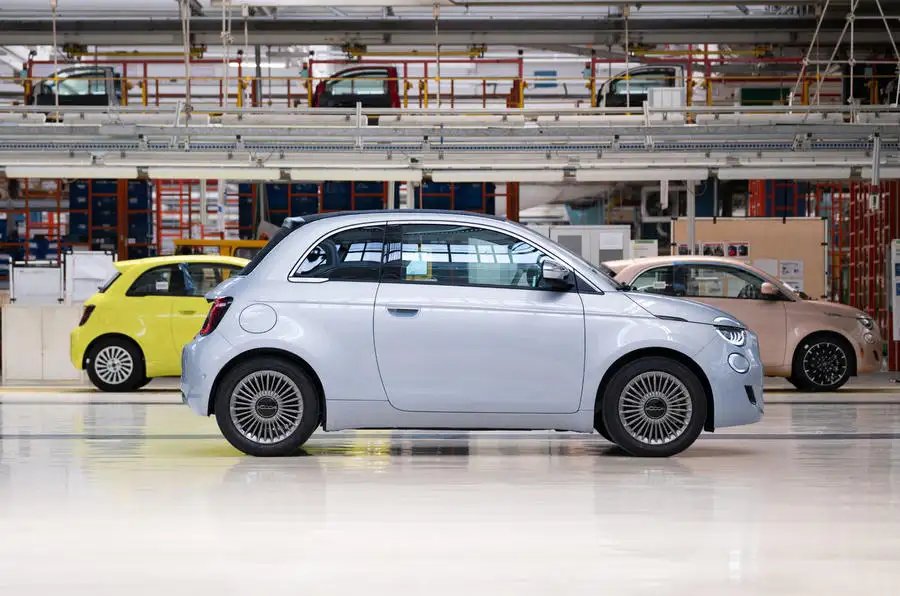Fiat 500e flops — is Stellantis throwing away $110 million?

You’d be forgiven for thinking the number in the new Fiat 500e’s name is supposed to indicate some sort of special, limited production number. After all, Fiat has sold just 439 500es in the United States since they hit the market earlier this year. But the exclusivity of the new 500 isn’t by choice — no one is buying them.
It’s hardly a mystery why, given their substandard range and inflated price tag. What’s more shocking is Stellantis’s plan to invest $110 million more into developing the 500 over the coming years.
Fiat has fallen far from its peak
When Fiat made its return to the United States nearly 15 years ago, its bargain-priced 500 was a hit. In just the first few years after it launched in the U.S., Fiat sold nearly 100,000 500s. It’s no wonder why. The 500 offered classically cute Italian styling, a huge variety of fun colors, and a very appealing price tag.
While the 500e may pick up some sales steam as interest rates decrease over the coming months, it hasn’t exactly been a smash hit since it went on the market in the second quarter of this year.
A growing production halt
Stellantis itself doesn’t seem particularly optimistic about 500e sales improving in the near future. The company halted production of the 500e in early September, with plans to restart the historic Mirafiori plant in Turin, Italy four weeks later. But that production halt has already been extended until November 1st.
"Mirafiori has already been closed. It's just that it reopens sometimes," said Giacomo Zulianello, a trade union official and plant worker among those laid off until the start of November.
Stellantis CEO Carlos Tavares told trade unions earlier this month that the electric car market in Europe is "in deep trouble."
Switching up the strategy
Stellantis’s $110 million investment in developing the Fiat 500 will take a couple of different routes. First, Fiat will be investing in an upgraded high-performance battery— hopefully one that helps boost the 500e’s substandard 149 combined range. Second, the company will be developing a hybrid version of the 500 set to arrive next year.
A hybrid 500 is a compelling prospect for interested buyers who have been put off by the low range of the current 500e. Recent data shows that hybrids and PHEVs have continued to gain market share in 2024 even as the market share growth of EVs has essentially stagnated. With U.S. buyers increasingly purchasing mixed-drivetrain vehicles a hybrid 500 could be a big seller for the struggling Italian automaker.
A warning from Stellantis’s CEO
Despite the promise of future investments from its parent company, Fiat may not have long to turn things around. Stellantis CEO Carlos Tavares recently told reporters at the Paris Auto Show that the company will be reviewing its portfolio of 14 automotive brands as early as 2026.
“We will review each brand’s performance at about two-thirds of the way through the Dare Forward 2030 plan, so you could expect decisions in two to three years,” Tavares told reporters.
Although Fiat has technically seen a year-over-year gain in U.S. sales this year, that’s only the case because the brand was only selling one model — the 500X — in 2022. This year, with both the 500X and the 500e on sale, Fiat has still only sold 786 U.S. cars through the third quarter — far less than every other brand on Stellantis’s sales report.
Final Thoughts
The Fiat 500e's rocky start in the U.S. underscores the difficulties facing automakers as they navigate the evolving EV market. With underwhelming sales, a subpar range, and a hefty price tag, the 500e hasn’t captured the same excitement that its gasoline-powered predecessor once did.
Stellantis’s push for a hybrid version might help bridge the gap for potential buyers who are hesitant to go fully electric, but it’s hard to ignore the bigger question: Does Fiat have enough time to pull off a turnaround?
As Stellantis reevaluates its brand portfolio in the coming years, Fiat’s future could very well hinge on the success of these new strategies. With production halts and CEO warnings casting shadows, the 500e — and Fiat as a whole — faces an uphill battle in proving it can remain relevant in an increasingly competitive car market. Only time will tell if these new investments will be enough to keep the iconic Italian brand rolling forward.
Related News


